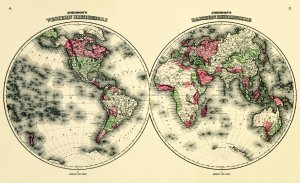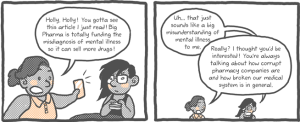
Source: Getty Images
Parents play a significant role in your life.
They are usually the ones who’ve raised you, cared for you, and nurtured you throughout your younger years. Consequently, there’s something (or at least there should be something) special and sacred about the relationship between children and parents.
However, whether that experience is positive or not, there’s something about that relationship that forever cements a memory that, in some way, shape, or form, informs how we experience the world.
However, having parents who act toxically can pose a challenge to this relationship.
It can feel heavy and burdensome and confusing. Because while you probably have love and care (of some type, to some extent) for your parent(s), you also realize the way they have imposed hurt, pain, and ignorance on to you.
And you may have felt that heaviness when they’ve unfairly talked down to you, mocked your accomplishments, or shamed you for your choices. You might have felt angry, frustrated, and trapped – especially if you are living with them.
And unless the situation is abusive or dangerous, you often feel like you have to make the best of it.
And this is where the process of working towards acceptance comes in.
Much of the residual pain and anger we feel comes from the fact that we know we deserve to be treated with love and respect, and if we don’t get what we believe we should, we’re socialized to blame ourselves – as if we are somehow responsible for our parents’ behavior.
But, in order to move towards healing, we have to accept that we can’t change other people’s truths, perceptions, or consequent behaviors. We can’t change the ways our parents disappoint us or project their toxicity onto us.
We can, however– if the relationship isn’t too damaged from abuse– attempt to encourage them to treat us, and themselves, better. We can act as influences, inspirations, and teachers, but they have to want to be influenced, inspired, and taught. Otherwise, our efforts are for nothing.
And while this has the potential to be a rewarding and healing experience, it can also be extremely tedious, difficult, and vulnerable. It will take a lot of work.
Remember, your parents think that they know more than you do. And in many cases, they probably do about a lot of different things.
But that doesn’t mean that they don’t have things to learn from you as well. If you are interested in playing a teaching role in that relationship, you have to tread carefully and intentionally.
In order for them to be open to respecting and learning from you, they will probably need to feel respected as your parents. But if you choose to go forward, remember to be willing to see your parents’ point of view and understand where they are coming from.
There is a difference between abuse and toxicity, and abusive behavior is intolerable. It’s important to make this distinction because they are not the same thing.
Toxicity involves a temperamental, critical and highly judgmental environment that may lead you to feel invalidated, shamed, or uncared for by your parents. This behavior is harmful, and leaves emotional scars and triggers like abuse does, but abuse and toxicity are not always the same thing. In fact and to be clear, abusive relationships also create temperamental, critical and highly judgmental environments that leave people feeling invalidated, shamed, and uncared for.
But, abusive relationships —whether physical, emotional, or both — on the other hand, threaten your well-being and safety. Abusive relationships are toxic.
But not all toxic relationships are abusive. These relationships don’t involve facing danger.
Abuse does. And for that reason, it’s important to do everything you can to remove yourself from abusive dynamics and stay as far away as possible. Some of you who have had your emotional/verbal abuse normalized, may even read this article and potentially identify your relationship as “only toxic.”
If your questioning, or know absolutely that you are in an abusive situation with your parents, know that you have options. Call your local domestic violence agency for more information about resources in your area. And remember: Your call is confidential.
However, learning to live with toxic parents can be tough, but it can be done.
If your parents are toxic, here are some handy tips to help you better cope:
1. Create a Toxic Parenting Coping Journal
Journaling is a great way to get in touch with your emotions and to process what’s going on in your life. Writing your thoughts helps you to reflect and channel the emotions and inner-conflict that you are facing at home.
In this journal, ask yourself what your struggles and frustrations are, as well as those of your parents.
Think about where the source of the conflict is and how you can work to get to the root of the problem.
To identify this source, think about your parents upbringing and how they were raised, the events and people that have shaped their lives, and their value systems – as well as yours.
Try then to be mindful of how you are responding to your parents.
Are you feeding their fire? Giving them reactions that they want?
When you are in an argument or toxic situation with a parent, notice how you respond. Observe your behavior, thoughts, and emotions.
Write them down and start looking for patterns. Think about how you can respond differently and gauge your response to diffuse the toxicity.
The more you practice this, the better you will become at learning how to respond without making yourself upset.
After doing this, if you feel comfortable, talk to your parents about this and see if they would be willing to work with you on creating a healthier household.
2. Reach Out to Friends and Trusted Family Members
Reaching out to friends and trusted family is a second step that can greatly assist you in coping with toxic parents.
Pull a friend or family member, aside, and have a deep, serious conversation about your feelings and experiences with your parents.
Ask them if they have ever noticed any toxic behavior between you and your parents, and also if they have any suggestions on how to better cope with your situation.
Sometimes reaching out to a friend or family member can be greatly beneficial to your relationship with your parents – they can serve as mediators!
Coping with toxic parents can oftentimes leave you feeling alone, so now is also a good time to communicate with your siblings!
Use this opportunity to spend time with your brothers and sisters. Grab a cup of coffee, catch a movie, or take a walk together.
Ask your siblings if they have noticed any toxic behaviors coming from your parents. You may be surprised at the answers that you receive!
Having a sibling as an ally doesn’t just offer great support to you, but can also strengthen your bond, especially if you have never been close to your siblings or if you’ve had a strained relationship.
If it is at all possible and it’s something that you think would benefit you, seek professional counseling. An unbiased opinion is often helpful!
If you attend school, seek advice from a guidance counselor. Also, many college campuses have counseling services that are offered at a discounted rate (or even free!) to students.
When you begin your counseling sessions, be as honest and open as possible about your situation. This is your opportunity to express how you feel freely and without judgment, so feel free to cry, scream, ask questions, and anything else you have to do to express your emotions. Take full advantage of this safe space with your counselor!
3. Distance Yourself and Create a Safe Space
Sometimes the best way to deal with a toxic situation is not to deal with it at all and instead to distance yourself from your aggressors.
This includes limiting conversations and engaging in unhealthy activities with your parents.
Begin by identifying which behaviors, gestures, or comments trigger conflict between you and your parents. You can never change how your parents react, but once you become aware of what the triggers are in conflict, you can manage the way you react to them.
If you detect that a situation is turning sour, simply walk away from the situation. There’s no need to add fuel to the fire.
Coping with toxic behavior from parents can be very emotionally draining and can take a toll on your self-esteem, so self-love is very important.Begin to dedicate more time to yourself!
Involve yourself in healthy, fun activities. Take up a yoga or Pilates course, learn a new skill, or pick up a few new books to read.
Now would also be a good time to foster relationships with new people and dedicate more time to your established friendships that may have been placed on the back-burner. After all, you’re going to need support!
***
Living with toxic parents is never an easy situation to deal with, but it can be bearable.
The most important thing is that you take care of yourself and not let your emotions get out of control.
Turn to your journal, trusted loved ones, and your safe space during turmoil. And if you need to get out, do so.
Always put yourself and your needs first. You deserve it.
[do_widget id=”text-101″]
Erin McKelle is an e-activist, video blogger, student, and non-profit advocate and has launched several projects including Fearless Feminism. In her spare time, Erin enjoys reading, writing bad poetry, drawing, politics and reality TV. You can find her blogging at Fearless Feminism, Facts About Feminism, and Period Positive. Follow her on Twitter @ErinMckelle and read her articles here.
Takeallah Russell is a sex-positive feminist and student at American Public University, pursuing a B.A in Child Development with minors in Sociology and Gender Studies. She also operates her own business, Burning Bra Birth Services. As a single mother with an African American and Native American background, she hopes to motivate more women like herself to become involved in feminist efforts. Read her blog, The Burning Bra, and follow her on Twitter @TheBurningBra.
Search our 3000+ articles!
Read our articles about:
Our online racial justice training
Used by hundreds of universities, non-profits, and businesses.
Click to learn more




















